This is my serialized story of hiking the Mountains-to-Sea Trail (MST), a 1,175-mile route that crosses the state of North Carolina. I’m hiking west from Jockey’s Ridge near Nags Head on the Outer Banks of the Atlantic Ocean to Kuwohi (formerly Clingmans Dome) near the Tennessee border in the Great Smoky Mountains. If you’d like to start at the beginning of my story, click here.
See the Mountains-to-Sea map at the bottom for reference.
A winter storm is coming. My wife, Karen, and I are eating lunch on a Sunday afternoon in January at a brew-pub in Burgaw, North Carolina. We are discussing what I’ll do when the storm hits on Tuesday. Karen wants to know how I plan to negotiate the storm when the next thirty-eight miles on the Mountains-to-Sea Trail have no listing of motels or campgrounds. Essentially, the only motel in the area is here in the town of Burgaw, where I will sleep tonight in order to start my ongoing Mountains-to-Sea journey first thing in the morning. My next sleeping arrangement is nearly forty miles away in the tiny town of Kelly, North Carolina, where I have permission to stay in its—how cool is this?—history museum.
Karen is not impressed. “Why would a hamlet like Kelly have a history museum?”
How would I know?
At home, the directions I’ve printed off for Segment 14 of the Mountains-to-Sea Trail, which covers the distance from the Holly Shelter Game Lands to the resort town of White Lake, North Carolina, is approximately sixty-six miles long. Between Burgaw and White Lake, though, is only Kelly. Richard Smith, the man who oversees the museum, assures me that sleeping at the museum will be absolutely fine. He only asks that I get there by five-thirty p.m. on Tuesday.
Karen says I have a significant problem. The storm is projected to hit this area Tuesday at noon.
It’s all confusing, I tell Karen, but bear with me.
I am waiting on a call from a trail angel who offers shuttle services, and I am hoping she will pick me up after I hike twenty miles to the Moores Creek National Battlefield, which, I tell Karen, used to have a campground in the field across from the historic park, but now, no longer does and, don’t ask, I don’t know why.
My hope is that the trail angel will bring me back to the motel in Burgaw. Tuesday, then, I’ll get a taxi or Uber driver to return me to the Moores Creek Battlefield so I can continue my hike onto Kelly, eighteen miles further down the road where Richard Smith and the Museum are waiting. If the weather is bad when I wake up on Tuesday, I might forgo the taxi and stay for a third night in Burgaw. This would be awful, though, so I plan to be in Kelly before the storm.
Karen wants me to call the trail angel right there and then, which I refuse to do, given I have left two messages already. With a promise I will call that evening, she drops me off at the Burgaw Motel before driving the two hours home. Fortunately, the Burgaw Motel is located catty-corner from the McDonald’s Drive-In where I picked up my car in October after walking thirteen miles from the Holly Shelter Game Lands. This is the nature of hiking the MST in stages; I must start where I left off to walk the entire 1,200 mile trail across North Carolina.
Sunday night I go through my backpack one more time and realize I am missing a few things I would normally carry, such as instant coffee and, most critically, a cup. How could I have forgotten my blue plastic cup?—I’ve backpacked with it everywhere. That evening I cross the street to the Food Lion shopping center and go into the grocery store. I buy twelve styrofoam cups for $2 and figure I can leave eleven of them in the motel room. I also find individual packets of instant coffee and I’m in heaven.

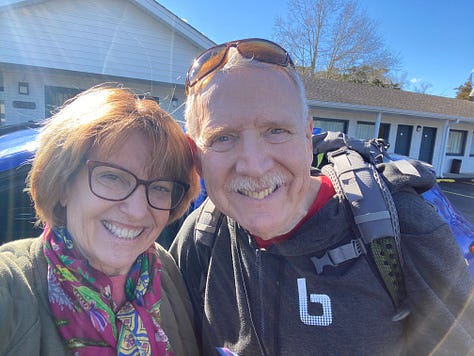

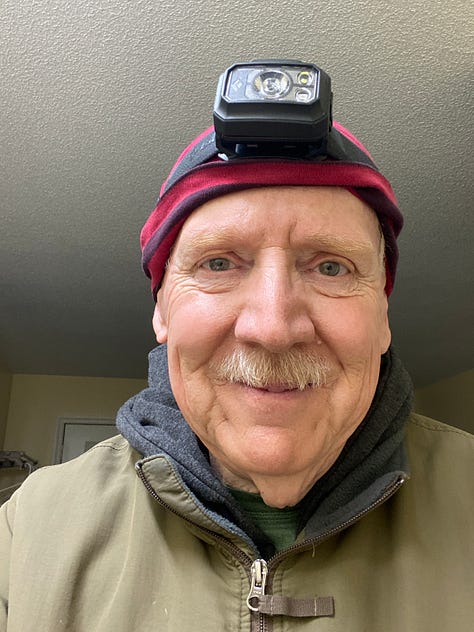
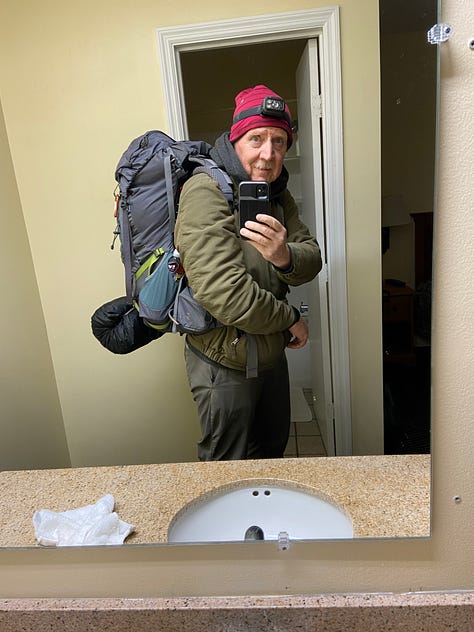
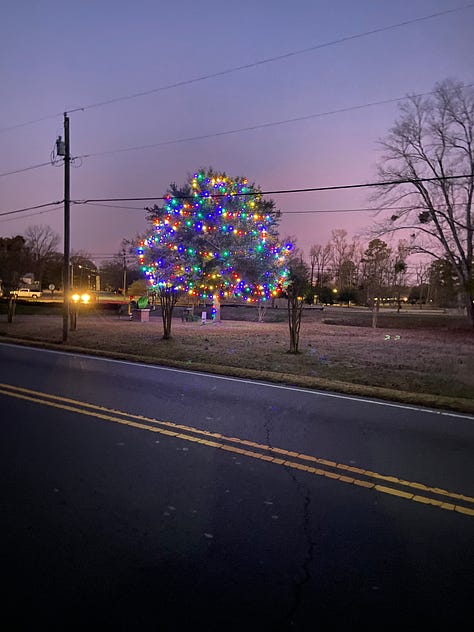
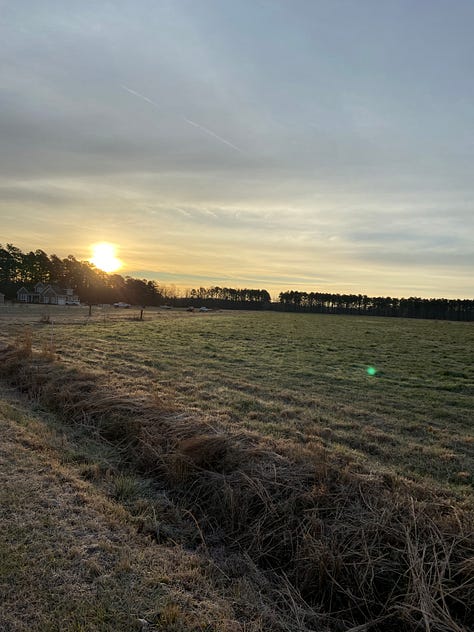
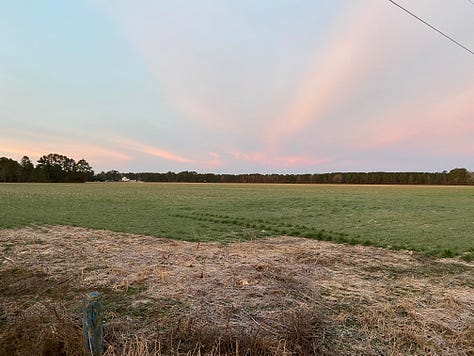
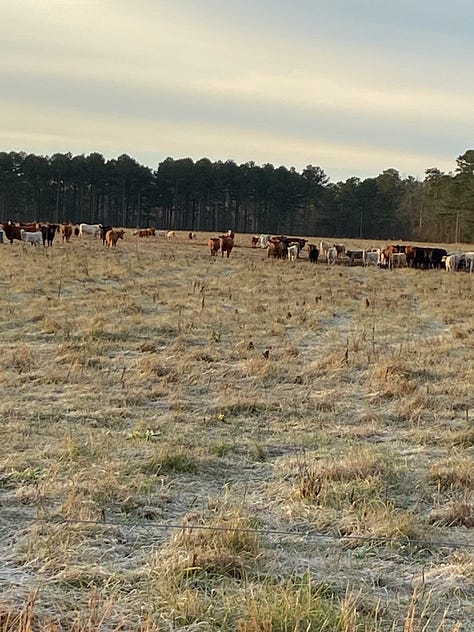
Monday morning bright and early I am up and ready to go. At six forty-five a.m., fifteen minutes later than I hoped, I am out of the motel room and on the trail westward through the town of Burgaw. A tree in the town is lit up with Christmas tree lights, and I take that as a good sign: like a biblical bush on fire, lighting my path. The morning temperatures are in the low thirties Fahrenheit and I am bundled accordingly—but I know North Carolina’s fluctuation in temperatures; I am sure I will be taking off my jacket and, maybe even, my sweater by mid-day.
Tuesday’s storm is on my mind. The trail angel who offers shuttle services to Burgaw called me Sunday evening and said she couldn’t pick me until after she gets off work at four p.m. I arrange for her to meet me at Moores Creek not knowing for certain how long it will take me to get there. Still, this seems so unnecessary: it would have been perfect if the park service hadn’t shut down the battlefield campground. That said, I am grateful for the volunteer’s willingness to shuttle me back to the motel.
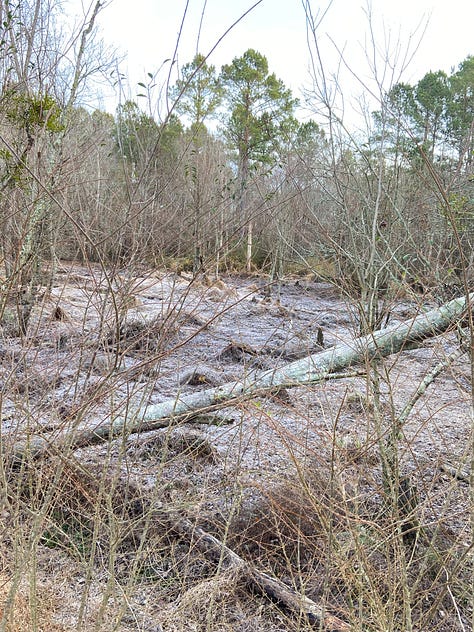
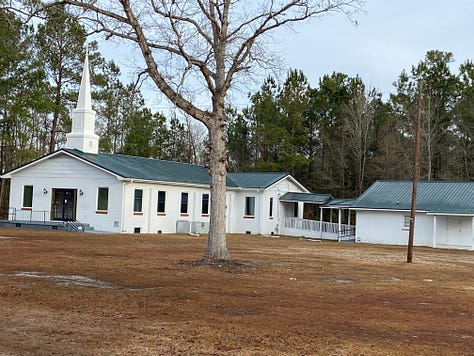
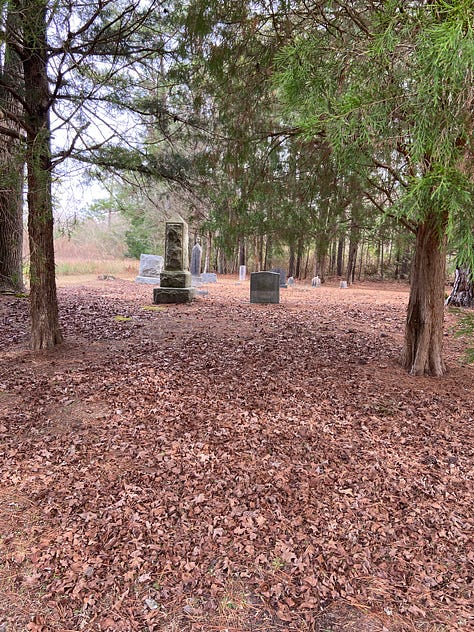


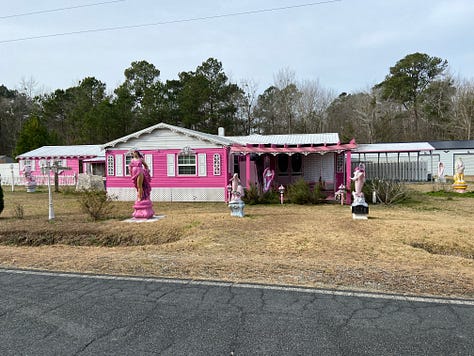

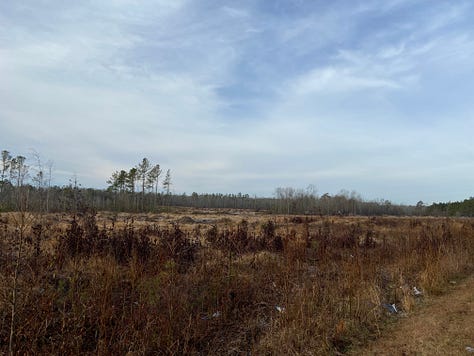
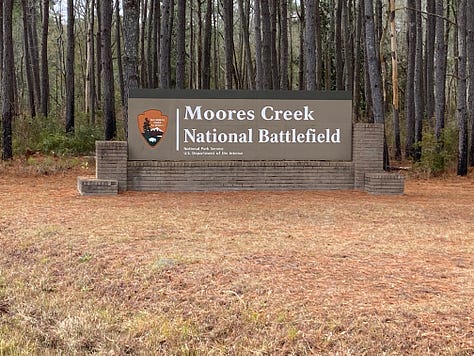
I am moving quickly with my thirty-pound pack on this my first day of a five-day hike and am completing four miles every hour-and-ten minutes. In three-and-a-half hours, I have covered twelve miles. By twelve-forty in the early afternoon, I have hiked twenty miles and am standing at the entrance to the Moores Creek Battlefield. Now I have a dilemma: I can walk around the battlefield and wait three hours for the trail angel to pick me up, or I can hike on and try to get to the town of Kelly. I realize walking an additional eighteen miles is pushing it, but my legs still feel fresh.
I decide to see if I can make it to Kelly and call Richard Smith at the museum. He’s good with me spending the night tonight rather than on Tuesday, so I message the trail angel and cancel my pickup at four. She’s good with that too! In my mind’s eye, I now see the plan before me: get to Kelly before dark and first thing Tuesday morning hike to the resort town of White Lake before the storm hits. I can sit out the storm in a motel room in White Lake, then continue my journey on Wednesday.

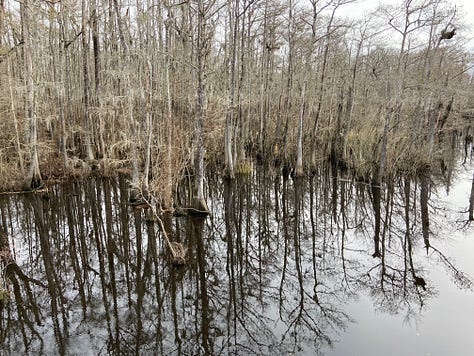



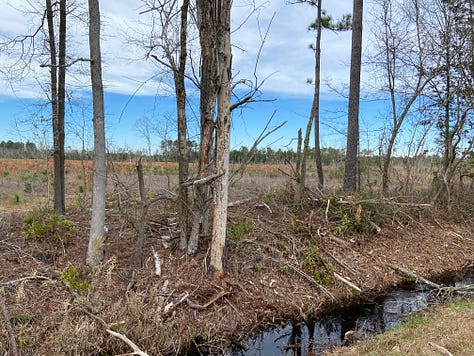


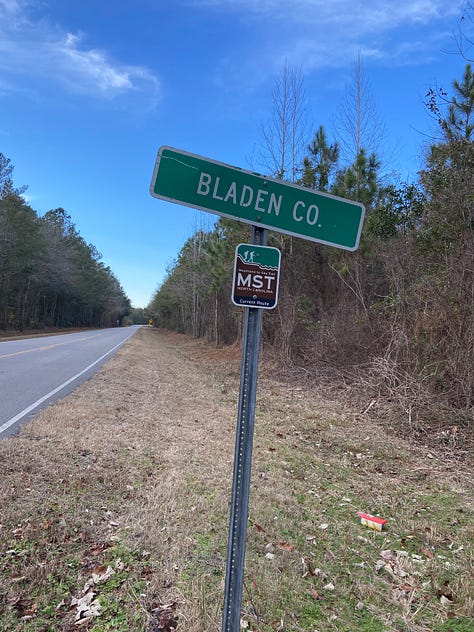
There’s something crazy about walking thirty-eight miles with a thirty-pound backpack. I suspect I need to prove to myself I can do this distance in one day—I had discovered after leaving the Outer Banks, the directions for the Mountains-to-Sea Trail provide limited accommodation options on occasion, so hiking forty miles to get from one camping site (or motel) to another is critical. That said, I realize the MST makes up for this with a list of trail angels willing to provide shelter or shuttle and, in truth, once I started utilizing their services, my hikes have been much smoother.
When I reach Kelly at dusk at around six p.m., my feet are extremely tender and I am dog-tired. However, I am worried that I am a half-an-hour late for Richard Smith at the museum. As I walk down the road, I spot the museum sign which appears to be in front of an old white church. I slowly go up and knock on the front double doors, but no one answers. I can’t believe how unlucky I am and tentatively walk to a side door and knock again, praying someone will help me. But, I see no cars in the parking area around back and the place remains as quiet as a tomb.
I take off my backpack, putting it down on the sidewalk near the side door, and begin to search for Richard’s phone number. It’s the only thing I can think of to do. My feet are too sore to walk much further and I hate the idea of putting up my tent in the dark somewhere off the road between here and White Lake.
As I am pulling out my contact sheet from the top pocket of my pack, a county sheriff’s cruiser pulls up beside the museum. For an officer in rural North Carolina, I can only imagine the distinction between a backpacker and a vagabond is fairly small, especially in spotting a person at dusk at a door on the side of a dark building.
The officer, a sheriff’s deputy, climbs out of the car. He’s heavy set with a belt thick with gadgets and a holstered gun. He walks up to me with his flashlight turned on in the fading light. I greet the officer and begin to explain my situation. I hand him my contact sheet with Richard Smith’s phone number on it as proof that I have been given permission to spend the night. The officer appears skeptical. Though he has never heard of the MST, he does seem impressed when I say I walked in from Burgaw.
Thirty-eight miles is pretty far, he says.
He flashes my backpack and studies the paper with Richard’s phone number. With my cell phone in my hand and his help holding the paper, I call Richard who answers right away. Richard has me pass my phone over to the officer and a short conversation ensues. The officer hands me back the phone and Richard tells me he’ll be there shortly as he lives just two miles away.
The deputy, having solved the problem to his satisfaction, wishes me the best of luck with my trek. He gets back into his cruiser and, with his lights now on, slowly continues his drive through Kelly.
A few minutes later Richard shows up in his car. He is an older man, maybe five to ten years older than me. After introducing ourselves, he leads me to the building next to the museum. Unlocking the door, he says I can spend the night here in the museum’s storage facility.
When he turns on the overhead lights, the inside of the building appeared to be one large room full of scattered furniture, odds and ends, such as an old dugout canoe, and bulging boxes of books and donated goods, like clothing and appliances. I am a little surprised by the random volume of clutter. In my mind I had another idea altogether of what sleeping in the history museum would be like. Still, this room has a kitchenette at the back as well as both a men and women’s bathroom. Richard assures me that the kitchen has a microwave and running water. At one time, at least, the room must have been a community center. Now though, it is simply a run-down space with no sense that anyone has been in here recently to straighten up the place.
I walk through the room with Richard and notice hundreds of dead bees littering the floor and, when we reach the kitchen, they are lying all over the counters. Though this is totally unappealing, I am thankful for Richard’s generosity and grateful to stay here. I see no cockroaches scurrying around and am thankful for that too.
Soon Richard hands me the keys and says I can walk to a small grocery store about two-hundred yards further down the road. Though, he cautions, at this point, the store is likely closed. I tell him my feet are too sore to walk anywhere. He says I should meet him there first thing in the morning for coffee and to return the keys.
Minutes later Richard leaves and I am on my own in a creepy room next to a dark church that is now a museum. I can only imagine Stephen King creating a bee story with me as the unwitting victim. I gather my resolve (and energy) and get organized for the night. I find an old broom and sweep the dead bees away from one area of the floor near an old dining room table and couch. This, then, is where I am staking my claim for the night. With a paper towel I gather the bees on the kitchen counter and dump them into a trash can. The microwave is absolutely filthy with dried tomato sauce and stuck-on blackened cheese—it’s like someone had burned a portion of a pizza inside it. I can’t imagine anyone now using it and I, for one, won’t. Still, after I clean the sink of bee carcasses, water does indeed run from the faucet. I let it run for a long while before filling the water bottles from my pack.
I can’t help but think of what a peculiar place this is to end a thirty-eight mile hike.
That night I make dinner with my camp stove on the kitchen table. Everything has been wiped off. The Good to Go trail dinner of rehydrated Kale and White Beans tastes great, especially after such a long day, though, if I wasn’t so tired, I could eat another packet. I empty my backpack on the table and slowly take off my shoes and socks. My feet are red, veiny, and sore and I can feel blisters on my foot pads. I knew I would pay a price for walking so far and here it is. If, later, some mass murderer wants to attack me with a borrowed hatchet from one of the piles of donated boxes, I will have to let him as I literally can’t walk—let alone run around the furniture to get away.
A knock at the front door startles me and I think immediately of the deputy who drove off before Richard arrived. Walking across the room in my bare feet proves to be nearly impossible, but I get there and open the door to find not the deputy, or even Richard, but a young couple with their seven-to-ten year-old daughter. The husband, a thin man with a short beard, is in front and has a plate covered in tinfoil. He offers it to me, saying they thought I might be hungry. The wife, behind the daughter, urges her forward to hand me a small gift bag full of cookies and candy.
The husband says, they heard how far I had walked and that I was spending the night here at the museum. They thought I might find this hot dinner satisfying. I am shocked and so very grateful and thank them profusely. They are not interested in coming inside to talk, though, and leave shortly thereafter.
As I walk back to my kitchen table encampment, I wonder if they are part of Richard’s family. Certainly, opening up the tinfoil to discover a plate of fried potatoes and hot pork rinds is wonderful. What a kind gesture this is and, unto itself, provides a nice final stamp on the day. People can be amazing. I am sleeping for free on a couch with a hot meal that cannot be beat—all due to the generosity of strangers.

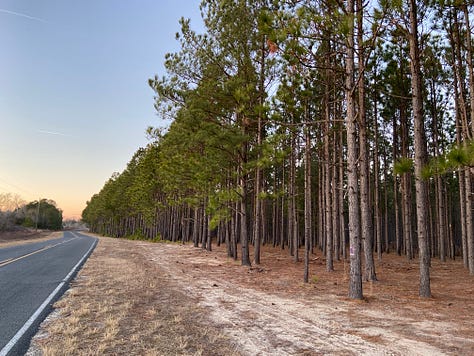
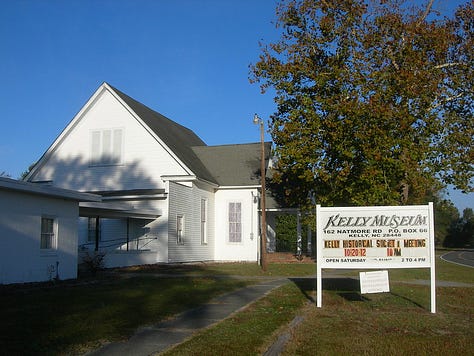
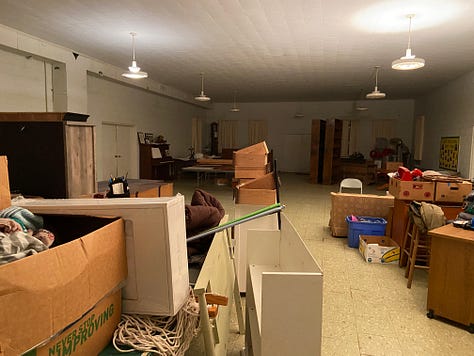
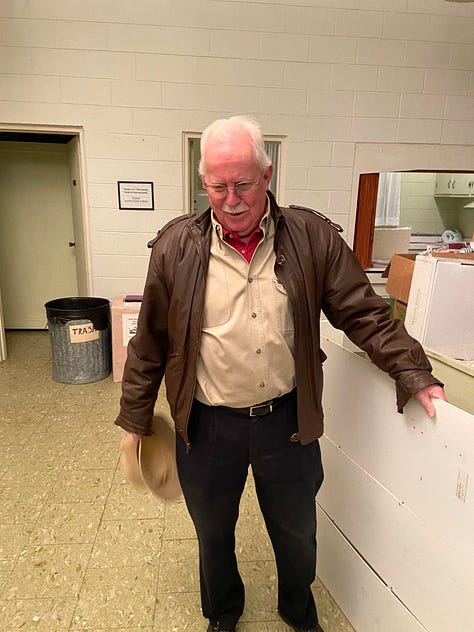
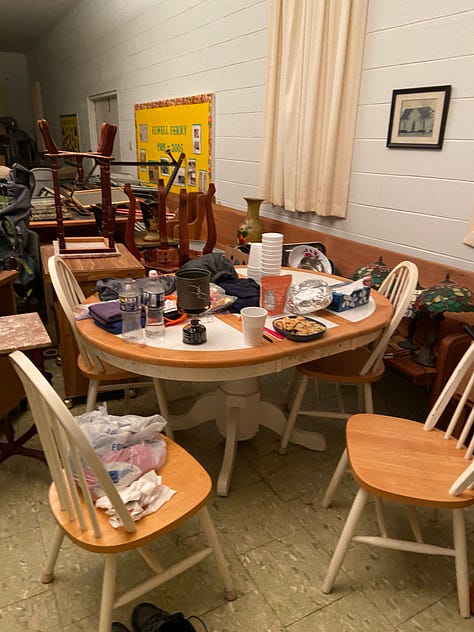
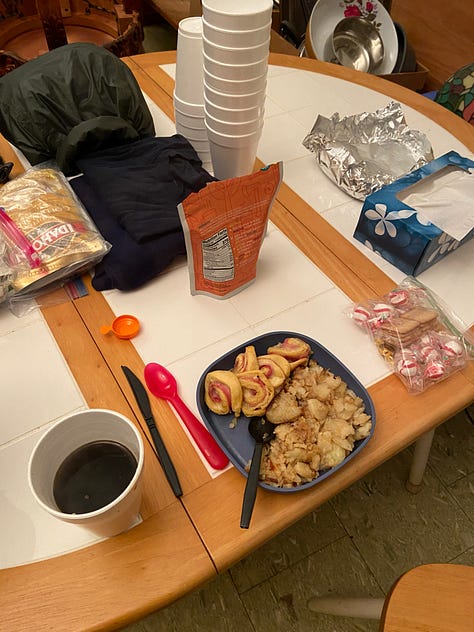
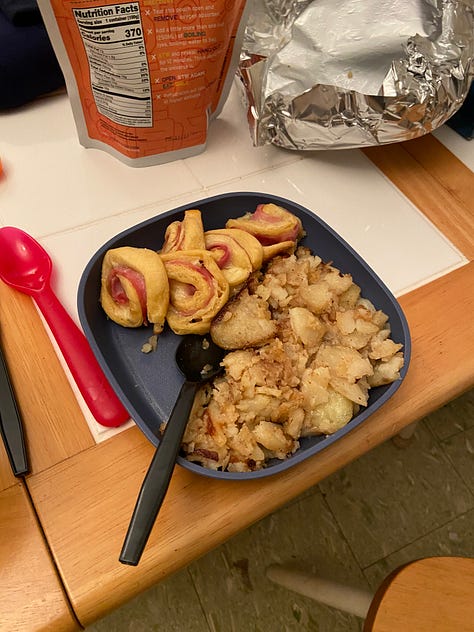

This sense of generosity goes even further.
In the middle of the afternoon as I walk to Kelly, my cell phone buzzes. I answer it and quickly realize from the low voice on the phone I am talking to Fire Chief Gary Brock. Back on Saturday I called Chief Brock to get permission to sleep at his fire station three nights from now. BUT, he is calling me here, out-of-the-blue, to warn me that the storm on Tuesday will be severe. He says the winds will be way too strong for me to camp in a tent. He is adamant: I should seek shelter before Tuesday afternoon.
He will come and get me, he adds, if I cannot make appropriate arrangements.
I realize, as I prepare the old couch with a sheet and blanket from my pack, that on Tuesday, no matter how sore my feet are, I must get to White Lake by noon. First thing, though, I will need to repack my backpack and drop off the dinner plate and keys to Richard Smith. With a twenty-mile hike ahead of me, I need a solid night’s sleep. I can’t afford to be creeped out in this crazy room by mass-murdering beekeepers and what may be their dodgy, Zombie bees. Still, before I get under my blanket and pull my hat over my eyes, I put a flyswatter beside me next to the couch and leave the lights on.
Click here to read the previous chapter.
Click here to read the next chapter.
Map of the Mountains-to-Sea Trail. This post focuses on Segment 14b.




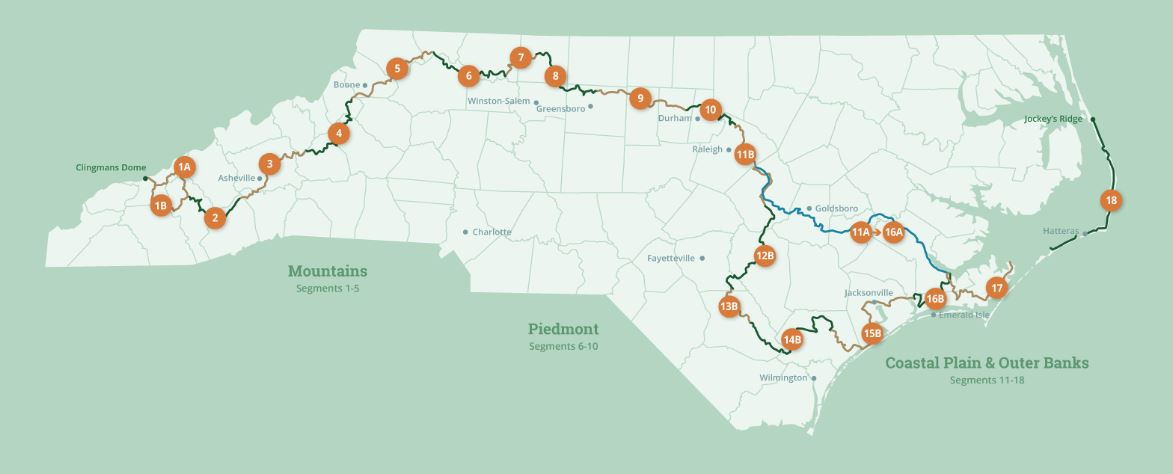
38 miles!?!? What great description of the “museum.” And pork rinds! Only in NC.
One looks to the day when the MST won’t have so many gaps.
Jonathan,
I loved this commentary! You are clearly the beast! So happy to hear about your MST angels; God is so good! Take care of you Jonathan. ❤️ Your SIL Marlene